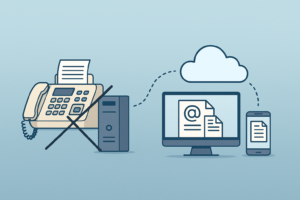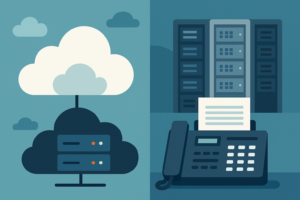Cybersecurity has become one of the hot-button issues of the 21st century, with new high-profile data breaches making headlines on an alarmingly regular basis. An offshoot of this problematic trend is a growing emphasis on how the health care sector adopts new technologies despite a foreboding cyberthreat landscape. Health care providers and insurers regularly handle sensitive medical data and personal information of millions of customers that, in the wrong hands, can wreak havoc; for example, earlier this year nearly 80 million Anthem customers became victims of a data breach.
In order to occlude entry and interception points exploited by hackers, all health care providers must abide by the Health Insurance Portability and Accountability Act. However, a recent report shows that many health care institutions continue to be non-compliant with HIPAA, further highlighting the fact that fax over IP is a friend to the health care sector.
Consumer messaging apps violate HIPAA compliance
Texting and free messaging platforms such as Facebook Messenger and Skype have taken the world by storm. And while the rate at which they have been embraced and the immediacy of communication they provide users are undeniable, most of these applications are non-compliant with HIPAA. Worse yet, employees of some health care organizations are using these apps for work-related tasks, according to a new study by Infinite Convergence Solutions. The study found that only 8 percent of health care institutions prohibit the use of consumer-grade apps, and that only one in four organizations using mobile messaging applications leverage a company-authorized solution.

An additional finding from the report is that 65 percent of respondents cite email as their sharing portal of choice. Email may seem like a more secure method of communication; however, email can be compromised with relative ease. Cybercriminals are becoming adept in their ability to successfully orchestrate phishing scams. These can be employed through a variety of tactics. Fraudsters might send out emails claiming that a bank account has been breached or that an online payment login has been compromised. They would then prompt the user to enter information to reset the account. In actuality, the user is willfully giving the hacker the keys to the door.
A bigger phishing threat to enterprises may come in the form of malware disguised as an innocuous email attachment such as a PDF. These may be sent from a trusted email account that has somehow been compromised. Without thinking, a user is liable to open the file, which could then worm its way into a network and pilfer sensitive information.
Long story short, email isn't much safer than consumer-grade messaging applications, despite user preferences toward it.
Fax is the closest thing to a failsafe solution
"With FoIP, health care institutions achieve safe, instantaneous data transfers."
Fax services have maintained a level of prominence in the health care sector that significantly exceeds most other industries – with a few exceptions such as finance and some government agencies. The reason for fax's success in health care is attributable to its ability to be HIPAA compliant. HIPAA compliant fax solutions can send sensitive information and documentation from point A to point B with little to no risk of interception, and in encrypted format no less.
And thanks to these encryption capabilities and other layered security tactics, machine-to-machine faxing is no longer the only option. Fax over Internet and email to fax are also viable solutions for health care institutions. HIPAA compliant fax over IP makes it possible to send sensitive information over an IP network rather than a traditional phone network. With FoIP, health care institutions achieve safe, instantaneous data transfers, allowing them to share information quickly, efficiently and most importantly, securely.
Enhance enterprise communication, collaboration and compliance efforts with a proven FoIP solution and HIPAA-compliant technology from FaxCore. Contact FaxCore today to learn more about their 'Partly-Cloudy' fax solutions.




